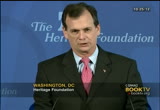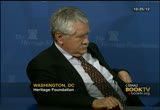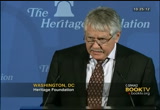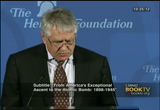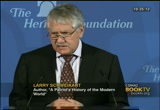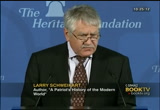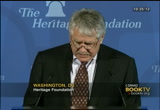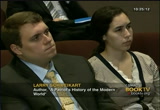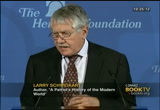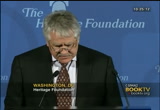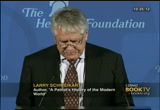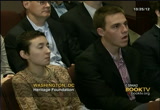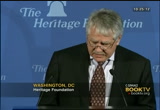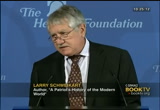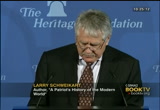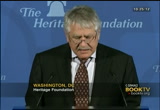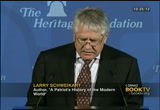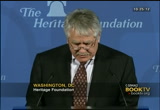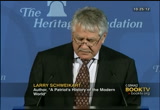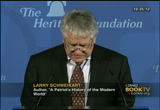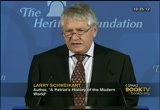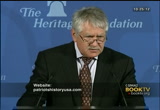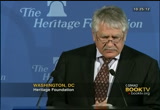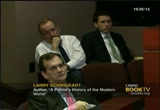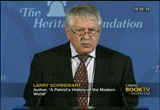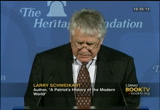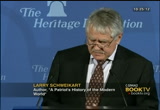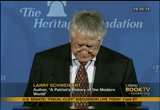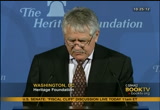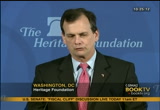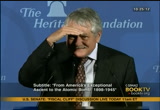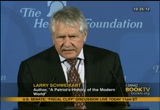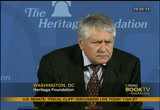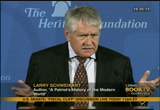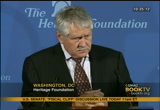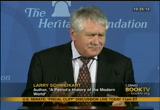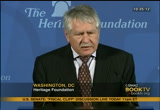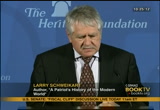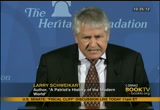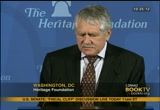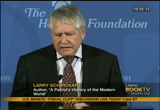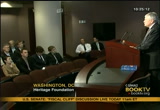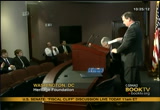tv Book TV CSPAN December 31, 2012 10:00am-10:45am EST
10:00 am
notable book selection, visit booktv's website, booktv.org, or our facebook page, facebook.com/booktv. >> for the next 45 minutes, larry schweikart presents a history of america's global participation and influence from 1898-1945. he also posits that during this time the united states introduced numerous political, cultural, and economic ideas to the rest of the world. >> good afternoon. thank you for joining us here at the heritage foundation in our lewis lemon auditorium. we, of course, welcome those who joins honor heritage.org website on all of these. would ask everyone here in house if you'd be so kind to check cell phones one last time and see that they are turned off. thank you, louis. amazing how many speakers actually start doing that. we will post the program on a website within 24 hours for your future reference, and, of course, our internet viewers are always welcome to e-mail us with
10:01 am
questions or comments, simply writing those to speaker@heritage.org. our guest today, doctor larry schweikart is a native arizonan turkey on this bachelor and masters degree at arizona state university and received his doctorate from university of california, santa barbara. throughout his high school and college, however, he spent most of his time playing drums in a variety of dance. as a rock, he was part of several groups, one of which opened for steppenwolf, among other performers for those old enough to remember them. his first film, rocking the wall, about rock music's art in bringing down communism begin airing on pbs this week and will continue throughout this year. doctor schweiker serves on the faculty at the university of dayton where he has taught business, economic history as well as military history. is the author of more than a dozen books, including his
10:02 am
first, "a patriot's history of the united states" which he co-authored. other topics include national defense, history and geography of, and the u.s. economy. a television series based upon pages history of the estates is currently in development as well. we are pleased to welcome dr. schweikart today to hear about his newest book, "a patriot's history of the modern world," which in this case is going to be from 1898 to just after the second world war. please join me in welcoming larry schweikart. larry? [applause] >> well, thanks so much to heritage foundation for inviting me here. it's really an honor and it's one that which my father was alive to see. heritage is one of those great passions of liberty and a swelling sea of collectivism. you probably do know that you are getting somebody here that
10:03 am
was a previous rock drummer. this later became significant in learning, as a learning experience when i began working on this film. but all along my expenses in the rock band were pretty informative. i, student i know all about communism because i was in a rock band. we shared everything, had nothing and start. when mike allen and i wrote "a patriot's history of the united states" in 2004, we identified three major elements that made up americanism. nevertheless, we never really provided a definition of american exceptionalism, and doing our revisions over time we kind of corrective that for the next addition that we hope will be out next year. even in 2004, it seemed a natural progression to move toward a history of the world, especially the modern world. it's the modern world that we see the truthfulness of american liberty and prosperity on
10:04 am
display. and under attack. through an amazon book review of "a patriot's history of the united states" i met dave doherty, an arkansas businessman historian, computer expert from evening shade, yes, there is an evening shade, arkansas. we first begin a top to bottom review of any -- and then over time i discovered he's a wonderful co-author and so asked him to help me with "a patriot's history of the modern world." he proved especially good in areas where i was week or and as a former intelligence officer in the army, he brought a new perspective to the cold war, especially in the second volume that we are working on now. and as john mentioned, this is volume one. goes up to 1945. volume two will be out about this time next year, 1946 to the present. i have to warn readers up front, especially those who have seen me speak before. probably know me for a little
10:05 am
more lighthearted or comic insertion, but this is a very sober and serious book. after all, the treated are making 98-1945 is an era dominated by two unspeakably deadly world wars, sandwiched around a nearly worldwide depression, and characterized by such loathsome villain such as mussolini, stalin and hitler. i don't think joe biden could laugh at them into. and while we have some sidebar sections, one my favorite is a comparison and contrast between the world's three leading architects of the day, frank lloyd wright and tony gaudi, and walter, who it into my nature, god and man, in that order. or robert perry during race for the north pole. the bulk of this book is dedicated to those political forces that reshaped this entry. as one who gravitates towards
10:06 am
the great man theory in most of my history, i was almost at a loss for words last week at a book signing event when a questioner asked me who's the most important person in your book? dawned on me, this really isn't a book about most important people. it's a book about great ideas, and terrible ideas, ideas that in the course of the century were tested in the most climactic of ways, war. but the most important of the ideas that we discuss is something many writers and intellectuals provided lipservice to, american exceptionalism, but which no one has really defined. we are kind of surprise as we went through to find there really wasn't a good definition of american exceptionalism. so i think that the first a congressman in "a patriot's history of the modern world." we examine and defined american exceptionalism through the identification of what we call the four pillars. these pillars shaped america, and then those same colors were
10:07 am
often largely, or even entirely ignored in shaping the post world war and were one and then later in the decolonization of the third world, which is part of the second volume. this book follows a 50 year struggle between those we call constitutionalists, want to strengthen the four pillars, and progressives, who want to destroy them. what are the four pillars? first, america was founded on the christian religion and predominantly influenced by protestantism. by the 20 century, catholics and jews played an important role, the culture 1900 was still fundamentally protestant, and even the progressives emerged from the liberal protestant churches. this reinforced a second exceptional pillar, common law, which posits that god-given, or the laws given from god to the
10:08 am
people and it bubbles up word to the rumors. it gives us the government of the people, by the people and for the people that lincoln referred to. common-law stand in stark opposition to almost every other nation on earth that has developed some form of civil law come in which law trickles down from the top. both germany and england had common-law for a while, but by the 20th century both have more or less abandoned it. germany more so than england. therefore, by the end of world war ii, when you have unloaded however unwillingly its colonies, those colonies were themselves designed on principles of civil law. us, the first two pillars taken together mean that a christian, protestant religion influenced and shaped everything about american foundation of laws and defined its system of personnel rights. it wasn't just that the united states was a democratic
10:09 am
republic, but that the very premises of what a democratic republic meant were likely to be far different in the united states than anywhere else. the second of, third of the pillars involves economic freedom. private property rights with legal titles and deeds, anti-free market economy. now, these may seem synonymous, but they are not. as hernando desoto pointed out, in many places of the world, there is and the symbols of a free economy at work. but there's no system of title deed to land or other property. this has two significant affect. first it means property ownership is never secure. you can never be sure that that government will come around and grab what you have. second though, it means individuals with deeds and titles can use their land as
10:10 am
collateral for business loans. this in turn of this its growth. in 1898, the united states had all four of these pillars. britain had three, was slowly losing common-law, france, germany and most european states had three, but some european states saw their religious character already beginning to fade. but around the world in africa, asia, latin america, few states had common-law and property rights with titles and deeds. america first came to world prominence after the spanish-american war ended in 1898. at the first time, it's argued that the u.s. acquired an empire with cuba and the philippines. yet, this were only revealed the deep differences between america and everyone else in history. for one of the first things, the
10:11 am
american congress did after the war was pass a law requiring the united states to give up the cuba. one searches in vain for major world power to ever voluntarily departed from concord region. at the 20 century gun, a group of liberal elites who embrace the program loosely known as progressivism, challenging, criticized these four pillars. most were hostile to common-law with president woodrow wilson being the prime example of one who thought the constitution needed tv malleable and only the fittest should direct society. as america stood on the edge of american leadership, europe entered a decade in which it convinced itself war was impossible. the book, grand illusion, captured the view that europeans were too advanced, too sophisticated to fight each other. john maynard keynes a code this with his famous observation about how the world was tied together, how an englishman could order from his doorstep
10:12 am
products from faraway lands and have them delivered to him. it's kind of an early version of thomas friedman's theory which claims an advanced country that used computers won't go to war with each other. i call it the starbucks to pick any two countries that have starbucks won't fight. you know, i guess unless they have like a triple espresso to another observer, in a much different way, posited that war would be so bloody and weaponry so deadly that no one would dare risk a conflict. all of these assume that european leaders would be rational, a stretch even in the present day. this, of course, vanished in august 1914, a war sparked by one of the most unlikely of accident when ferdinand on his way back from sarajevo turned away from its planned route to visit a guard injured in an earlier failed assassination attempt of course he drove to
10:13 am
his death, an incident that would plunge the world into conflagration. i won't delve into the details of world war i here, that's the most significant aspects in the united states was when america finally entered the war, the british and french hoped to insert american boys piecemeal into their own shattered units. general john "blackjack" pershing to his undying credit utterly refused, insisting the americans fight as an independent army, which they did. the revival of progressivism came at the first site conference of 1990 in which ideals dominate the discussions. but not the actual final arrangements in most cases. practical british goals of eliminate the german navy come or the french objective of limiting germany as a land-based threat received wilson's support so that he could institute a league of nation. a feel-good toothless unmotivated group of
10:14 am
international elite. but wilsonian idealism did play a central role in reshaping postwar europe map. as william ashman millions of people were moved around the continent like chess pieces and borders were changed by client on etch-a-sketch. one participant called people under discussion quote abstract lumps. another warren quote, the phrase national self-determination is simply loaded with dynamite. it will raise hopes that can never be realized. think of the misery it will cause, unquote. british diplomats walked into a study to find david lloyd george, and woodrow wilson bending over a giant map spread on the carpet. he said, quote, they are cutting the baghdad railway. clemens with his hand on the map looked like a gorilla of yellow ivory. it is upholding these ignorant
10:15 am
and irresponsible men should be cutting asia minor tidbits, as if they were dividing a cake. entire populations were relocated to facilitate national self-determination's, and democracy was imposed on nations that lack the most basic of pillars of exceptionalism. it's hardly a surprise that with a decade most of these had collapsed into totalitarian dictatorship, unstable, unpopular, or undesirable democracies, or autocratic regimes. rather than blaming communism or progressivism, most of the collapsing new states vented their fury on democracy and democratic systems. but the '20s which produced an astounding level of wealth and high standard of living in america had a dark side in europe and america through the birth of public health programs that quickly morphed into new gen x. concerns about public height genes mask deeper hostility to
10:16 am
jews in europe and ethnic minorities in america. as early as 1921 in germany a lawyer and psychiatrist call for quote the destruction of life that is no longer worth living. can you say death panel? he insisted it was a dodgers national duty to quote eliminate idiots and the value us, unquote. voluntary sterilization laws were passed in denmark, sweden, norway, switzerland. britain's report on mental deficiency called those identify with middle -- mental disorder quote a social problem group. in both europe and america -- with eugenics. in america a group was led by such people as margaret sanger, whose journal, the birth control review, endorsed her friends book, quote, the title is the
10:17 am
rising tide of color, against white world supremacy. her into this negro project use black ministers, including adam clayton powell to promote birth control. but the effort in england, germany and the united states to melt public health and eugenics rampart deeper. rather, they found their way into international and state policy with support from groups such as the national committee for mental hygiene, urging sterilization as a newcomer to quote prevent this class of persons from propagating, unquote. germany use venereal disease law to enlist doctors, greatly extending the power of the state into the private sphere kind producing a union with a medical profession that would be preferred rather easily in the third reich. in germany, one expert observe quote the more scientific a doctor's outlook was, the more politically naïve he was.
10:18 am
it was perhaps the highest and most sinister irony that american eugenicists, charles davenport, giddily wrote mary, daughter of railroad tycoon eh harriman, who headed the eugenics record office in new york, saying quote, the pfizer team is going to be a purifying conflagration one day, unquote. his prophecy would come true only 20 years later at a cost of millions. fairly easy for governments to manipulate public health, medicines and doctors for purposes of quote family planning. this soon led into policies about colonial possessions and citizenship. peoples of egypt, india, algeria and africa clearly did not fit the progress is a view of educated elite. and by their definitions, were close to quote life unworthy of life, unquote.
10:19 am
but these trends would marinate for a decade. in the meantime, american prosperity continued spreading to the rest of the civilized world. american advertisers, film, even literature became highly desired in europe. it's another irony of this time, american movies followed a production code that emphasized universal american themes of patriotism. god, fair play, and they avoided sensationalism, sexual situations and other taboo vices. american movies sold american exceptionalism, including quote puritanical moralism as one observer put it. they occasionally make fun of those values to the work of people such as buster keaton and charlie chaplin, but this was all done tongue-in-cheek and never meant to totally undermine the system itself. my 1930, the u.s. had 18,000 movie houses, and compared to
10:20 am
france's 2400, and britain's 3000. europe simply could not compete with hollywood, and as long as hollywood sold american exceptionalism, europeans wanted to be like mike. or in this case, wanted to be like clark gable. but inflation, communist agitation, ethnic unrest, and most of all the contradictions of versailles soon cause the structure to crumble into the totalitarian moment. spain, of course with its civil war was the first to see the future. the fascist rose to power in italy, then germany, then a samara totalitarian culture in japan where a fascination await anyone who questioned the destiny of japan to all of asia, the remaining democracies in europe lacked the will to stop even the weakest of aggressors. when mussolini successfully crushed ethiopia, and none of the league of nations states oppose them, that's higher -- it was already dead.
10:21 am
this of course was long before hitler invaded poland. a world war ii let me only but they say that what saved the world in our view was that the progressive liberal, new deal government of franklin d. roosevelt, most likely out of sheer desperation unleashed a productive power of free market capitalism to bury the acid towers in a tsunami of tanks, planes, and ships. anyone who's read my my books knows the statistics of pink slime just not far from where i teach, a tank was built from scratch in four and a half hours. henry kaiser's shipyard churned out a liberty ship in a record four and a half days. that's faster than most of my students can write one of their semester papers. this undergirded american military strategy of using weapons and technology to
10:22 am
thoroughly pummeled the enemy before a single american soldier was sent into battle. the war also exposed the fact that japan, which adopted some of the capitalistic production methods in america, lacked the essential powers of exceptionalism to employ them fully in wartime. without free speech, free markets, constitutional protection that about great inventors and businessmen to try new ideas and fail without punishment, japan fell behind the u.s. almost instantly. in four years of war, the u.s. produced 17 fleet carriers. japan, one. we go into, for example, two guys viewed as failures our at least not very successful guys, and that would be andrew jackson higgins, who produced an incredible number of craft, landing craft, but after the war
10:23 am
was kind of out of business, but especially we look at people like howard hughes. howard hughes is viewed as a giant failure during world war ii because he doesn't produce any weapons that work. everybody knows about the spruce goose. he produces the wooden reconnaissance airplane, very fast but they are really use before the end of the war. this is the whole point. people like howard hughes where necessary so that we could have people like henry kaiser. it's only because you have the failures that you know what doesn't work. every time something doesn't work you know not to go there. and so it's because we have this, and other countries did not, they insisted that you win every time or you die. that's going to cause a problem down the line. that's no different than europe. the german miracle of economic production was, in fact, a façade. supported by mass conscription that eliminated unemployment, but by 1934 and early 1935,
10:24 am
germany's economy was already rolling back to its pre-hitler status. only the imposition of tears on eastern europe which had no other trading partners, and soon the acquisition of slave workers allowed albert's theater to sustain nazi production. even then, germany faced a fatal and hugely ironic reality of reverse 11 strong in which undesirable people were flooding back into germany to sustain the war effort. both german soldiers and vast numbers were being sent to russia to die. when the germans surrendered and the japanese were pushed back to their home island, the american propensity to save the human lives while wasting cheaper bullets and bombs reached its zenith with the dropping of the two atomic bombs. virtually all of the relevant
10:25 am
evidence, recent evidence from both american and japanese sources nowadays president harry truman's decision to drop both bombs. japanese leaders did not display the slightest acknowledgment of military reality, illustrated by the report of a doctor. japan's top atomic scientist who was sent down to the regime of the following day and he had to report back to the emperor. and he was asked was this an atomic bomb? yes, it's an atomic bomb. then came the line, how long till we get when? it's hardly the response of somebody looking for a way to surrender. truman intended to show japan that he would use any weapon at our disposal. there was no atomic diplomacy. he wanted to show the japanese that it was surrender or die. when japan 70, came the victory of the principles of american exceptionalism, worldwide.
10:26 am
unlike all the previous empires, the u.s. was unwilling to dominate the free world the way previous victors had. that postwar world asked of america that it share its resources unreservedly, restrain itself economically, and rebuild both former friends and enemies enthusiastically. this in turn would produce heretofore wealth and leisure in western europe. all provided by the protection of the american military. that wealth and leisure would in turn the road the very institution and disciplines needed to maintain let alone expand freedom and prosperity for others. i wanted to mention just for a moment the role of the soviet union in world war ii, because i think we take this on as a challenge to much of the prevailing wisdom. yes, after 1942, the red army overwhelmed the nazi in men and
10:27 am
intakes. but it was nip and at in the winter of 1941-42. one study suggests that a full 85% of heavy armor outside moscow in the winter of 1942 was a british. the best fighter plane in 1941-42 in the red air force was a plane the americans wouldn't even fly, the p. 39 eric over. the soviets with all the radius, all their wire, all the shipping to provide all that stuff, trucks. all they had to do was get men in uniform and make tanks and artillery, which they did. so yes, they overwhelmed the nazis but it came with a fantastic amount of support from the united states. as american soldiers arrived in england, the new war began between american and british generals for the command of allied armies.
10:28 am
dwight eisenhower was the supreme commander, but the british constantly talked about him and denigrated american troops in general, in private and in public. ike's great talent was he found this pashtun much the way george washington brushed aside his own impotence of ordnance in the revolution your while at key moments he put his foot down and essentially told the brits to stuff it. that didn't stop field marshal bernard montgomery from becoming a thorn in the sight of all american commanders in europe for the duration of the war. but ike, omar bradley, george patton all managed to work around to minimize the negative impacts of the war effort. so when the war ends we are expected to supply wealth and prosperity to all. we do to the death of our ability. and yet this brings with it this ironing that by supplying wealth and protection you are eroding
10:29 am
the very disciplines that are necessary to maintain and perpetuate prosperity for yourself and prosperity and freedom for others. that would be the challenge for the next 75 years and the topic of volume two. how to provide a canopy of liberty and perpetuate american exceptionalism while allowing in just enough rain of difficulty and disappointment to remind americans and the world that the era in which we've all been blessed was no golden accident. and with that, i am open for questions. [applause] >> we will accept questions from the floor. there will be a microphone passed, and when you are recognize, if you would not mind stating your name and affiliation, if there is one. i have the first question for larry. is there not a fifth pillar, what i would call the american spirit, but most of the people who came to this continent chose to come to do what they could do for themselves and how well they
10:30 am
could do? .. >> yes, sir. oh, i thought you had the mic. >> good afternoon. robert -- [inaudible] u.s. army war college. much is made of the, and when people try to argue in favor of government expenditures like the new deal or the recent stimulus package of the government expenditures during world war ii
10:31 am
and how that fixed the economy. i was wondering if you can address that in any way. >> great question, and we do address this at length in the book. first of all, people need to understand that war is different than peace. what is a consumer good in peacetime? well, it's a flat screen tv, it's a car, it's a starbucks. what's a consumer good in wartime? it's a tank or a bullet or a bomb. any consumer would gladly forgo other products to buy that if it means they stay alive. so the first thing you have to recognize is that in wartime people are redirecting their purchasing power and efforts away from consumer goods into wartime goods. second thing i would argue is that, in fact, world war ii does stimulate but not for all of the demand-side, keynesian reasons that are usually given. it stimulates because it's a giant supply-side pump primer. what happens is americans have nothing to buy for four years. no factories are making any
10:32 am
cars, they're not making any consumer items at all, there's nothing to buy. so most americans, certainly with the urging of their government, invest. and they invest in savings bonds. so at the end of four pfaff, five years -- four and a half, five years, name come out with this pent-up demand, but they also have invested, and business now has the ability to go in and make a giant supply-side investment. i think it's a classic response to, you know, an economic situation. it's just the opposite of what keynes argued. >> [inaudible] >> elizabeth clifford. what do you think -- [inaudible] the second volume. what do you think are the circumstances that are required to keep the american exceptionalism a robust idea? >> yes, that's, of course, a question that's before us right now. and it is, um, how much ethnicity, how much national
10:33 am
difference, how much diversity do you permit in without destroying the very elements that permit that diversity to come in in the first place. and, um, i think certainly english language is one of those things that must be maintained. i think, certainly, having control of your borders is absolutely essential. um, i think that there are a number of cultural issues that probably have to be maintained; religion and so on. charles murray, not to give a plug to another book on booktv, but charles murray has a great book called "coming apart," and it deals with these very issues. and he shows how segregated our society has become in the last 50 years. not racially, but -- i hate this word because i'm not a marxist, but class wise. and it's very true. i remember growing up in chandler, arizona, a city of about 12,000. and my dad was a ranch foreman on a cattle ranch. didn't make a ton of money, and
10:34 am
yet somehow he provided for my mother, my college education, insurance. i don't know how he did it. but i looked across the street at another very middle class family. i looked across the street diagonally, and one of the richest families in chandler lived there, and the lot next to them was their pool and their poolhouse. who's a guest at their pool every single week? me. who plays monopoly with their kids? me. you don't see that much anymore. the superzips, as murray calls them, are highly i insulated and rarely get middle america at all in terms of entertainment, culturally, it's just a terrible split. and that is something we have to repair. >> [inaudible] >> matt flynn, charles koch foundation. when you say that it's something we need to repair, what would you prescribe to be a fix for that? isn't that undermining the idea of spontaneous order? >> no.
10:35 am
i think that all order has certain constraints that it acts within. you know, water's formed when you unite oxygen and hydrogen. so i think that that spontaneous stuff has to happen when you have control of your borders, when you have an english language, when you -- let me go back to a previous book, to give a plug to that, "what would the founders say." and one of the things i noted in the section on education, and it surprised me, was that almost all the founders favored some sort of public education. i was getting into that, and i thought, all right, i'm going to find home schoolers here. it didn't happen. but what i found put that in that public education, they expected and demanded that certain things be taught, and those certain things were, you know, math and language skills. but also a patriotic history. and this was the phrase that they actually used. a history about how great it is to be an american. and one of them -- and since i
10:36 am
didn't prepare that book for this talk, i forget who it was -- but he said something to the extent of all these other countries are great. all these other countries have stuff, but we are the best, and we can't understand them til we understand ourselves, and we must teach a patriotic american history. so i think as said in the founding that in order to have that spontaneity, you have to have a certain construct of structure. >> joe stanton, heritage foundation. how would you evaluate fdr's overall legacy? >> um, disaster? i think that he set america's economy back eight, ten years. there's very good evidence now, and i call your attention to a study by steven -- [inaudible] which is not widely cited. the study is one of the wage and hours act. and he shows that this act alone probably insured that we would
10:37 am
never get back to 1929 employment under roosevelt. basically, he compares the hours worked to business confidence and business expectations. and what he shows is that the number of hours worked stayed, went down while the number of -- i'm sorry, the number of workers stayed constant while the number of hours worked went down. in other words, they were going from ten full-time employees to five part-time employees or something along those lines. and he finds 85-90% of the decline after 1934 when the first wage and hours act goes into place can be traced directly to this idea of a minimum wage. in terms of all of the other regulations, the excessive taxation, it's just one disaster after another. i mean, everyone -- and one of the things we do in "patriot's history" is we have a three-page chart that i've never seen
10:38 am
anywhere else of the new deal and new deal programs x. we show what the program was, what its original goal was and what it looked like 50 years after. and it's amazing that 50 years after all of these things are disasters from banking regulation to minimum wage laws to agriculture. my stepfather, when my dad died, my mother remarried another farmer, and i used to do his books. and i remembered getting the government subsidy check. i want to thank all you guys very much for putting me through school, i appreciate it. but they were huge. and it was ridiculous that we were getting these kinds of checks. it pays farmers not to grow. now, you students, come on. you're going to get paid not to turn in papers? teachers are going to get paid not to teach? that was the equivalent of the agricultural adjustment act. so, you know, without that we might have been sunk without the war, because as i say, roosevelt out of desperation turns really,
10:39 am
unleashes american business, turns to free market principles and lets the american businessman more or less free. >> do we have somebody over there? and then one in the back too. >> anthony koppel, the heritage foundation. as you may know, howard zinn's people's history is even a primary text in some classrooms in america, unfortunately. how do you introduce your "patriot's history of the united states" to an audience of students who might have grown up on people's history? how do you introduce your work and your frame of reference to them who might have been presented or started with a different frame of reference? >> well, i do have a talk called why students need a patriot's history of the united states. but a couple of years ago i did a book called "48 liberal lies about american history." it's a clever title, but really what i did was i looked at the top 20 u.s. history textbooks, college textbooks. and what i found was that they
10:40 am
all, almost without exclusion, shared certain similar just falsehoods like the rosenbergs were innocent or one favorite one is transcontinental railroads never would have been built without government help. and, in fact, candidate barack obama used that example when he was arguing for, yes, a computer czar. we need to have a computer czar because, after all, the transcontinentals couldn't have been built without government help. well, excuse me, there's a guy named james j. hill, and james j. hill built the northern pacific railroad without a dime of government support. and guess what? it's the only one not to fail in the panic of 1873. all of the government-supported railroads collapsed because they're not profitable. now, my own students usually come to me having not read zinn. i get constant e-mails from people who say we had to read zinn in high school, and thank
10:41 am
god for your book. i'm sure he yets the same -- he gets the same kind of messages. i don't introduce it, it's just out there for people to get. and it's interesting, we're making a rapid progress toward catching zinn and his total sales in the last four or five years. we're on a trajectory to at least catch him pretty soon. he had about a, what, 15-year head start. >> and one in the back? >> my name is pete dylan, i'm the marine corps fellow at the atlantic council. i have two questions. number one, your taughts on how profound the paris peace conference was, specifically carving up the map on the rest of the 20th century. and then, number two, why did you choose the flag raising on the cover of your book? >> number one, perhaps next to the new deal, the versailles conference is one of the worst things of the 20th century. it gives us, in essence, world
10:42 am
war ii. and it not only is bad from the standpoint of destroying national entities by moving people around and putting them in a situation where there's going to be inevitable conflict, that's one of the things it does. it destroys the very concept of collective security because, obviously, league of nations is a monstrous failure. in terms of the flag raising orer is batch chi, it just seemed very symbolic that as the flag goes up, america's stock in the world was rising to this point of prominence. semper fi. >> any other questions? thank you, larry. >> thank you. [applause] >> and as noted, we do have copies available. larry will be glad to sign them, have additional conversation up here on the panel table as well. we thank you all for your kind attention and hope to see you
10:43 am
again soon in the future. we are dismissed. [inaudible conversations] >> for more information visit the author's web site, patriotshistoryusa.com. with just days left in 2012, many publications are putting together their year-end lists of notable bookings. booktv will feature several of these lists focusing on nonfiction selections. these titles were included in kirkus book review's best nonfiction of 2012 list. in "haiti," lawyer rent duboise examines haiti's history. david talbot presents a history of san francisco in the 1970s in "season of the witch: enchantment, terror and deliverance in the city of love." in "quiet: the power of introverts in a world that can't stop talking," author susan cain examines the benefits of an
10:44 am
introverted personality. david von trailly looks at the second year of the civil war in "rise to greatness." watch for this book as it's featured on booktv in the coming days. and in "full body burden: growing up in the nuclear shadow of rocky flats," kristin i've veryson investigates the nuclear weapons plant located near her childhood home. for an extended list of 2012 notable book selections, visit booktv's web site, booktv.org, or our facebook page, facebook.com/booktv. >> mark shriver recounts the life of his father, sargent shriver, founder of the peace corps and director of president lyndon johnson's office of economic opportunity. this is a little over an hour.
137 Views
IN COLLECTIONS
CSPAN2 Television Archive
Television Archive  Television Archive News Search Service
Television Archive News Search Service 
Uploaded by TV Archive on

 Live Music Archive
Live Music Archive Librivox Free Audio
Librivox Free Audio Metropolitan Museum
Metropolitan Museum Cleveland Museum of Art
Cleveland Museum of Art Internet Arcade
Internet Arcade Console Living Room
Console Living Room Books to Borrow
Books to Borrow Open Library
Open Library TV News
TV News Understanding 9/11
Understanding 9/11
